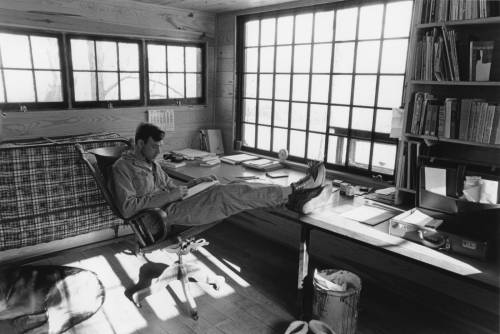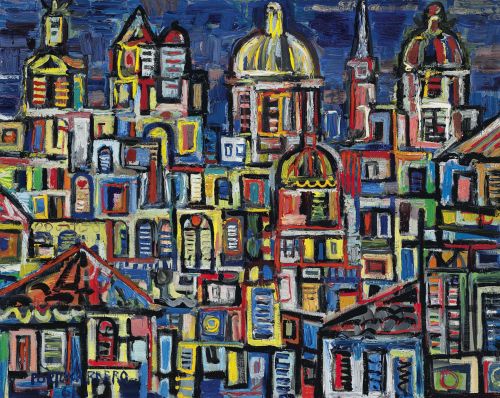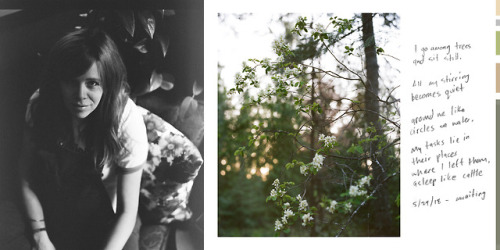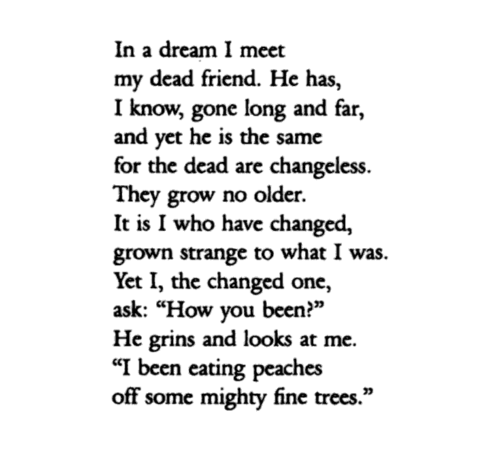#wendell berry
One of several old black and white photos illustrating Dorothy Wickenden’s profile of Wendell Berry:
In the “long-legged house,” a remote cabin with no plumbing or electricity, [Wendell] Berry has written fifty-two books, during breaks from farmwork and teaching.
Post link
“The Terrapin” – Wendell Berry
“The Terrapin” — Wendell Berry
“The Terrapin”
by
Wendell Berry
The terrapin and his house are one.
Though he may go, he’s never gone.
He’s housed within, from nose to toe:
A door, a floor, and no window.
There’s little room; the light is dim;
His furniture is only him.
He doesn’t speak what he thinks about;
Where no guest comes, a thought’s a shout.
He pokes along; he’s in no haste:
He has no map and no suitcase;
He has no…
One of several old black and white photos illustrating Dorothy Wickenden’s profile of Wendell Berry:
In the “long-legged house,” a remote cabin with no plumbing or electricity, [Wendell] Berry has written fifty-two books, during breaks from farmwork and teaching.
Post link
Condemnation by category is the lowest form of hatred, for it is cold-hearted and abstract, lacking the heat and even the courage of a personal hatred. Categorical hatred is the hatred of the mob, which makes cowards brave. And there is nothing more fearful than a religious mob overflowing with righteousness, as at the crucifixion, and before, and since. This sort of violence can happen only after we have made a categorical refusal of kindness to heretics, foreigners, enemies, or any other group different from ourselves.
Post link
(by Wendell Berry)
Love the quick profit, the annual raise,
vacation with pay. Want more
of everything ready-made. Be afraid
to know your neighbors and to die.
And you will have a window in your head.
Not even your future will be a mystery
any more. Your mind will be punched in a card
and shut away in a little drawer.
When they want you to buy something
they will call you. When they want you
to die for profit they will let you know.
So, friends, every day do something
that won’t compute. Love the Lord.
Love the world. Work for nothing.
Take all that you have and be poor.
Love someone who does not deserve it.
Denounce the government and embrace
the flag. Hope to live in that free
republic for which it stands.
Give your approval to all you cannot
understand. Praise ignorance, for what man
has not encountered he has not destroyed.
Ask the questions that have no answers.
Invest in the millennium. Plant sequoias.
Say that your main crop is the forest
that you did not plant,
that you will not live to harvest.
Say that the leaves are harvested
when they have rotted into the mold.
Call that profit. Prophesy such returns.
Put your faith in the two inches of humus
that will build under the trees
every thousand years.
Listen to carrion — put your ear
close, and hear the faint chattering
of the songs that are to come.
Expect the end of the world. Laugh.
Laughter is immeasurable. Be joyful
though you have considered all the facts.
So long as women do not go cheap
for power, please women more than men.
Ask yourself: Will this satisfy
a woman satisfied to bear a child?
Will this disturb the sleep
of a woman near to giving birth?
Go with your love to the fields.
Lie easy in the shade. Rest your head
in her lap. Swear allegiance
to what is nighest your thoughts.
As soon as the generals and the politicos
can predict the motions of your mind,
lose it. Leave it as a sign
to mark the false trail, the way
you didn’t go. Be like the fox
who makes more tracks than necessary,
some in the wrong direction.
Practice resurrection.
“If we are to hope to correct our abuses of each other and of other races and of our land, and if our effort to correct these abuses is to be more than a political fad that will in the long run be only another form of abuse, then we are going to have to go far beyond public protest and political action. We are going to have to gather up the fragments of knowledge and responsibility that we have parceled out to the bureaus and the corporations and the specialists, and we are going to have to put those fragments back together again in our own minds and in our families and households and neighborhoods. We need better government, no doubt about it. But we also need better minds, better friendships, better marriages, better communities. We need persons and households that do not have to wait upon organizations, but can make necessary changes in themselves, on their own.”
-Wendell Berry, “Think Little” (1970) in The Art of the Commonplace, (Berkeley: Counterpoint, 2002), 86.
“… [T]he movement to preserve the environment [should] be seen to be, as I think it has to be, not a digression from the civil rights and peace movements, but the logical culmination of those movements. For I believe that the separation of these three problems is artificial. They have the same cause, and that is the mentality of greed and exploitation. The mentality that exploits and destroys the natural environment is the same that abuses racial and economic minorities, that imposed on young men the tyranny of the military draft, that makes war against peasants and women and children with the indifference of technology. The mentality that gives institutionalized insult to black people and panic at the prospect of race riots. It is the same mentality that can mount deliberate warfare against a civilian population and then express moral shock at the logical consequence of such warfare at My Lai. We would be fools to believe we could solve any one of these problems without solving the others.”
–Wendell Berry, “Think Little” (1970) in The Art of the Commonplace, (Berkeley: Counterpoint, 2002), 82.
“A true and appropriate answer to our race problem, as to many others, would be restoration of our communities—it being understood that a community, properly speaking, cannot exclude or mistreat any of its members. This is what we forgot during slavery and the industrialization that followed, and have never remembered. A proper community, we should remember also, is a commonwealth: a place, a resource, and an economy. It answers the needs, practical as well as social and spiritual, of its members—among them the need to need one another. The answer to the present alignment of political power with wealth is the restoration of the identity of community and economy.
“Is this something that the government could help with? Of course it is. Community cannot be made by government prescription and mandate, but the government, in its proper role as promoter of the general welfare, preserver of the public peace, and forbidder of injustice, could do much to promote the improvement of communities. If it wanted to, it could end its collusion with the wealthy and the corporations and the ‘special interests.’ It could stand, as it is supposed to, between wealth and power. It could assure the possibility that a poor person might hold office. It could protect, by strict forbiddings, the disruption of the integrity of a community or a local economy or an ecosystem by any sort of commercial or industrial enterprise, that is, it could enforce proprieties of scale. It could understand that economic justice does not consist in giving the power to the most money.
“The government could do such things. But we know well it is not going to do them; it is not even going to consider doing them, because community integrity, and the decentralization of power and economy that it implies, is antithetical to the ambitions of the corporations. The government’s aim, therefore, is racial indifference, not integrated communities. Does this mean that our predicament is hopeless? No. It only means that our predicament is extremely unfavorable, as the human predicament has often been.
“What the government will or will not do is finally beside the point. If people do not have the government they want, then they will have a government they must either change or endure. Finally, all the issues that I have discussed here are neither political nor economic, but moral and spiritual. What is at issue here is our character as a people. It is necessary to look beyond the government to the possibility—one that seems to be growing—that people will reject what have been the prevailing assumptions, and begin to strengthen and defend their communities on their own.”
–Wendell Berry, “Racism and the Economy” (1988) in The Art of the Commonplace, (Berkeley: Counterpoint, 2002), 63-64.
“The great enemy of freedom is the alignment of political power with wealth. This alignment destroys the commonwealth—that is, the natural wealth of localities and the local economies of household, neighborhood, and community—and so destroys democracy, of which the commonwealth is the foundation and the practical means. This happens—it is happening—because the alignment of wealth and power permits economic value to overturn value of any other kind. The value of everything is reduced to its market price. A thing not marketable has no value. It is increasingly apparent that we cannot value things except by selling them, and that we think it acceptable, and indeed respectable, to sell anything.”
–Wendell Berry, “Racism and the Economy” (1988) in The Art of the Commonplace, (Berkeley: Counterpoint, 2002), 58.
“After more than thirty years, I have at last arrived at the candor necessary to stand on this part of the earth that is so full of my own history and so much damaged by it, and ask: What isthis place? What is in it? What is its nature? How should men live in it? What must I do?
"I have not found the answers, though I believe that in partial and fragmentary ways they have begun to come to me. But the questions are more important than their answers. In the final sense they haveno answers. They are like the questions—they are perhaps the same questions—that were the discipline of Job. They are a part of the necessary enactment of humility, teaching a man what his importance is, what his responsibility is, and what his place is, both on the earth and in the order of things. And though the answers must always come obscurely and in fragments, the questions must be asked. They are fertile questions. In their implications and in their effects, they are moral and aesthetic and, in the best and fullest sense, practical. They promise a relationship to the world that is decent and preserving.
"They are also, both in origin and effect, religious. I am uneasy with the term, for such religion as has been openly practiced in this part of the world has promoted and fed upon a destructive schism between body and soul, Heaven and earth. It has encouraged people to believe that the world is of no importance, and that their only obligation in it is to submit to certain churchly formulas in order to get to Heaven. And so the people who might have been expected to care most selflessly for the world have had their minds turned elsewhere—to a pursuit of ‘salvation’ that was really only another form of gluttony and self-love, the desire to perpetuate their lives beyond the life of the world. The Heaven-bent have abused the earth thoughtlessly, by inattention, and their negligence has permitted and encouraged others to abuse it deliberately. Once the creator was removed from the creation, divinity became only a remote abstraction, a social weapon in the hands of the religious institutions. This split in public values produced or was accompanied by, as it was bound to be, an equally artificial and ugly division in people’s lives, so that a man, while pursuing Heaven with the sublime appetite he thought of as his soul, could turn his heart against his neighbors and his hands against the world. For these reasons, though I know that my questions arereligious, I dislike having to saythat they are.
"But when I ask them my aim is not primarily to get to Heaven. Though Heaven is certainly more important than the earth if all they say about it is true, it is still morally incidental to it and dependent on it, and I can only imagine it and desire it in terms of what I know of the earth. And so my questions do not aspire beyond the earth. They aspire towardit and into it. Perhaps they aspire throughit. They are religious because they are asked at the limit of what I know; they acknowledge mystery and honor its presence in the creation; they are spoken in reverence for the order and grace that I see, and that I trust beyond my power to see.”
–Wendell Berry, “A Native Hill” in The Art of the Commonplace, (Berkeley: Counterpoint, 2002), 22-23.
“We have lived by the assumption that what was good for us would be good for the world. And this has been based on the even flimsier assumption that we could know with certainty what was good even for us. We have fulfilled the danger of this by making our personal pride and greed the standard of our behavior toward the world—to the incalculable disadvantage of the world and every living thing in it. And now, perhaps very close to too late, our great error has become clear. It is not only our own creativity—our own capacity for life—that is stifled by our arrogant assumption; the creation itself is stifled.
“We have been wrong. We must change our lives, so that it will be possible to live by the contrary assumption that what is good for the world will be good for us. And that requires that we make the effort to know the world and to learn what is good for it. We must learn to cooperate in its processes, and to yield to its limits. But even more important, we must learn to acknowledge that the creation is full of mystery; we will never entirely understand it. We must abandon arrogance and stand in awe. We must recover the sense of the majesty of creation, and the ability to be worshipful in its presence. For I do not doubt that it is only on the condition of humility and reverence before the world that our species will be able to remain on it.”
–Wendell Berry, “A Native Hill” in The Art of the Commonplace, (Berkeley: Counterpoint, 2002), 20.
“There appears to be a law that when creatures have reached the level of consciousness, as men have, they must become conscious of the creation; they must learn how they fit into it and what its needs are and what it requires of them, or else pay a terrible penalty: the spirit of the creation will go out of them, and they will become destructive; the very earth will depart from them and go where they cannot follow.”
–Wendell Berry, “A Native Hill” in The Art of the Commonplace, (Berkeley: Counterpoint, 2002), 18-19
And I say to myself: Here is your road
without beginning or end, appearing
out of the earth and ending in it, bearing
no load but the hawk’s kill, and the leaves
building earth on it, something more
to be borne. Tracks fill with earth
and return to absence. The road was worn
by men bearing earth along it. They have come
to endlessness. In their passing
they could not stay in, trees have risen
and stand still. It is leading to the dark,
to mornings where you are not. Here
is your road, beginningless and endless as God.
–Wendell Berry, untitled poem from “A Native Hill” in The Art of the Commonplace, (Berkeley: Counterpoint, 2002), 17-18.
“I am forever being crept up on and newly startled by the realization that my people established themselves here by killing or driving out the original possessors, by the awareness that people were once bought and sold here by my people, by the sense of the violence they have done to their own kind and to each other and to the earth, by the evidence of their persistent failure to serve either the place or their own community in it. I am forced, against all my hopes and inclinations, to regard the history of my people here as the progress of the doom of what I value most in the world: the life and health of the earth, the peacefulness of human communities and households.”
–Wendell Berry, “A Native Hill” in The Art of the Commonplace, (Berkeley: Counterpoint, 2002), 8.
“The only true and effective ‘operator’s manual for spaceship earth’ is not a book that any human will ever write; it is hundreds of thousands of local cultures.”
~ Wendell Berry
[Landscape of Havana, 1969 - René Portocarrero]
• Poet, novelist, and environmentalist Wendell Berry lives in Port Royal, Kentucky near his birthplace, where he has maintained a farm for over 40 years. Mistrustful of technology, he holds deep reverence for the land and is a staunch defender of agrarian values. He is the author of over 50 books of poetry, fiction, and essays. His poetry celebrates the holiness of life and everyday miracles often taken for granted. More: https://www.poetryfoundation.org/poets/wendell-berry
• A large part of Portocarrero’s work deals with Spanish colonial subjects and Spanish-Cuban interiors. The search for national and tropical elements is superimposed on the baroque undercurrent which in large measure defines his work. … Also important is the series … of cathedrals: through a long evolution, buildings and cathedrals are combined in cityscapes which developed into the central theme of the artist’s work. More: https://panamericanart.com/artist/rene-portocarrero/
Post link
Awaiting
Priest River, ID
May 29, 2018
—-
Poem is a portion of the first found in Wendell Berry’s book A Timbered Choir
Post link

The Peace of Wild Things
When despair for the world grows in me / And I wake in the night at the least sound / in fear of what my life and my children’s lives may be, / I go and lie down where the wood drake / rests in his beauty on the water, and the great heron feeds. / I come into the peace of wild things /who do not tax their lives with forethought / of grief. I come into the presence of still water. / and I feel above me the day-blind stars / waiting with their light. For a time / I rest in the grace of the world, and I am free.
Wendell Berry

My final spiritual practice – after gratitude, meditation, and journalling – is being in nature. This is probably the most meaningful and restorative practice for me – spending time walking in the woods always lightens my spirit – and the one I find hardest to experience living in the surburban Greater Toronto Area. I typically drive so much I don’t want to drive moreto get out of the city, and…






